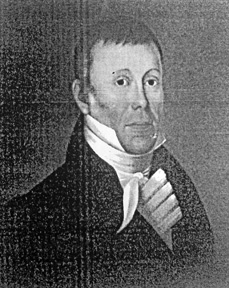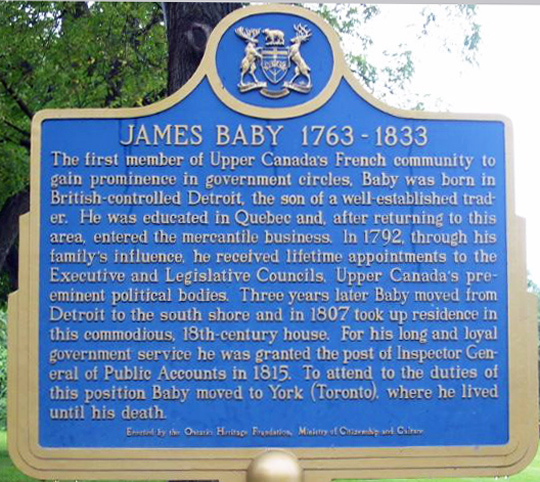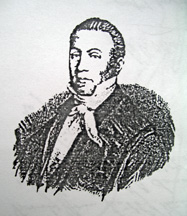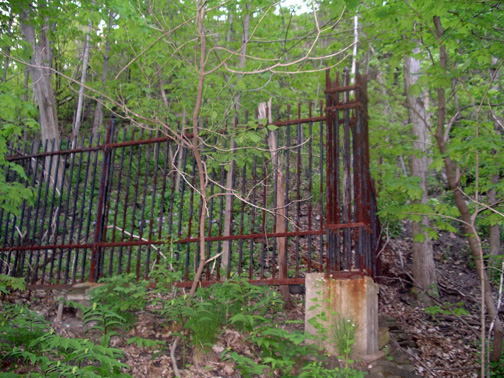

Baby, James - (baptized Jacques) 1763-1833 (69)
Merchant, politician, office holder, judge, landowner, and militia officer; 1763 - 1833. Inspector General (Treasurer) of Upper Canada 1815.
b. 25 August 1763 in Detroit,
son of Jacques Duperont Baby, and Susanne Reaume (Rheaume), dit La Croix;
m. secondly 1802 Elizabeth Abbott, they had five sons and one daughter (6)
d. 19 February, 1833 at York (Toronto), Upper Canada.
James (Jacques) Baby was the eldest son of a prestigious family in the Detroit area. As a young man, James Baby was educated in the province of Quebec under the supervision of his uncle Francois Baby.
At the conclusion of his studies his father sent him on a European tour, during which Baby married an actress. Soon after, he was recalled by his father who ended the union by providing her with a pension.
Baby was then initiated into his father's commercial affairs and amassed considerable wealth.
Baby's family had been renowned for its loyalty to the crown since the conquest(1760). After the division of the old province of Quebec in 1791 into Upper & Lower Canada, he became one of western Upper Canada's foremost office holders.
Because of his loyalty and the need to represent the French community in the area, Lieutenant Governor John Graves Simcoe named him in 1792 to the Executive and Legislative Councils and the County Lieutenancy of Kent.
In 1793 Baby accepted an appointment from Simcoe as Judge of the Surrogate Court for the Western District.
1799 -At age he 36 he was appointed Deputy Superintendent General of Indian affairs.
In 1800 - Baby and Richard England, the commandant of Detroit, organized the local militia of whom were French Canadians; in part, Baby's role was to secure the loyalty of his people.

Following Jay's Treaty of November 1794, the Baby family abandoned the Detroit region and moved to Sandwich (Windsor), where they built a residence and store.
Image courtesy of Ontario Historical Plaques { Ontario Historical Plaques }click to enlarge
Baby augmented his finances by acquiring large amounts of land in various parts of Upper Canada, through entitlement and by purchase throughout the period from 1793 to 1800. In 1793 he secured 3,000 acres in his father's name, 1,200 acres for his mother, and 1,200 acres for each of his brothers - lands which were located in Yarmouth Township. He was entitled to 6,000 acres as an executive councillor, only to receive 5,300 because of possible conflicts with other claimants. In addition, he claimed small acreages in Aldborough and Sandwich townships and 1,500 acres in Dunwich Township. Total approx: 30,000 acres (excluding Baby Point)
 At the outbreak of the War of 1812, Baby led the militia from Sandwich to Amherstburg. His family was forced to flee when the invading American army entered Sandwich on 13 July and the Baby home was pillaged. According to Pierre Berton in "The Invasion of Canada 1812-1813" (2001)
the American forces in Canada turned it into their military headquarters for the duration of that conflict.
At the outbreak of the War of 1812, Baby led the militia from Sandwich to Amherstburg. His family was forced to flee when the invading American army entered Sandwich on 13 July and the Baby home was pillaged. According to Pierre Berton in "The Invasion of Canada 1812-1813" (2001)
the American forces in Canada turned it into their military headquarters for the duration of that conflict.
Baby was taken prisoner at the disastrous battle of Moraviantown on Oct. 5, 1813 at the Battle of the Thames, but released shortly after. He had sustained considerable losses
and he was never compensated for the damage to his home.
His greatest loss in these years, however, was his second wife, who died during an epidemic of fever in the winter of 1812-13. Tired, ill, with young children, and stricken with grief, Baby retired to Quebec late in 1813 for rest and medical care.
 In 1815 Baby was appointed Inspector General for Upper Canada by Simcoe and moved to York where, with his five sons, he built a home on an estate with 1,500 acres of uncultivated land. This property was the Baby Point Estate situated on the very lands that were once the site of the historic Seneca Indian Village of Tiaiacon.
In 1815 Baby was appointed Inspector General for Upper Canada by Simcoe and moved to York where, with his five sons, he built a home on an estate with 1,500 acres of uncultivated land. This property was the Baby Point Estate situated on the very lands that were once the site of the historic Seneca Indian Village of Tiaiacon.
Additionally, this is the same land that forms the Baby Point enclave developed after 1910 by Robert Home Smith and his firm the Humber Valley Survey and Toronto Land Corporation.
It has been a source of continuing interest how Simcoe was persuaded to make this appointment, but in fact Baby had been appointed to both the Executive Council and Legislative Council
of Upper Canada as far back as July 1792. It was his appointment as Inspector General of Upper Canada, that occurred in 1815. By that time Baby was a full fledged member of the
"Family Compact"
This still begs the question as to how this fourth generation of French upbringing came to gain entry into the most WASPish of British Colonial bastions.
The answer may lie in a passage recently noted in the refreshing book by
Robert M MacIntosh "Earliest Toronto" in which he quotes an extract from
John Ross Robertson's " The Diary of Mrs. John Graves Simcoe" in which she comments on social life in Quebec City during the Simcoe's first year in Canada in the winter of 1791,
"Monday 19th. - Dined and supped at Madame Baby's, wife of Monsieur Baby, a member of the Legislative Council" (of Quebec)....
James Baby attended to his administrative and political duties faithfully and only on rare occasions missed a meeting of the Executive Council. In the capital York (now Toronto) he enjoyed the friendship of the members of the so-called 'Family Compact". His conservatism, his traditional Roman Catholicism, which inculcated respect for authority, and his refusal to accept American democratic ideas made him a natural part of this group.
In addition to the inspector generalship, Baby was one of the commissioners of forfeited estates charged with settling the property affairs of men who had been traitors during the war of 1812. In 1823 he was appointed Upper Canada's arbitrator in the dispute over the sharing of customs revenues with Lower Canada. The arbitration was successful and ended an acutely difficult period in the province's financial history.
By 1827 Baby's influence was diminishing. He had become largely dependent on his emoluments from office to support his family. Historian John Charles Dent suggests this reliance compromised him politically. For instance, on one occasion, Baby voted against his conscience and with the administration on the issue of taxing wild lands.
While at York Baby continued to speculate in land. Avoidance of taxation by speculators was a common occurrence in the early 19th century and Baby was no exception. On a large number of his properties he failed to pay his taxes and as a consequence stood to lose more than 9,000 acres.
In addition to his activity in the land market, he continued to receive land for his services to government. As a militia colonel he was allowed 1,200 acres. He died, however, before the transactions could be finalized, and 26 years later his only surviving executor (Strachan) was still involved in the legal ramifications.
At a period when pluralism of office was common, James Baby was an office holder par excellence; between 1792 and 1830 he held more than 115 appointments or commissions of varying degrees of importance.
Gracious and distinguished, he was the epitome of a gentleman. He was an impressive figure possessed, according to his grandson, of a "primitive simplicity" and a "moral beauty." Strachan eulogized him as "a Christian without guile, affable and polished in his manners, courteous in his conversation, dignified in his deportment, warm in his affections, steady in his friendships and unshaken in his principles."
A stalwart member of the Roman Catholic community, he played a key role in building York's first Catholic church, St Paul's. He died Feb 19,1833 at age 69 in York. His funeral was well attended, and shops and offices were closed in his honour. He was buried in St Paul's churchyard and later was reinterred at Sandwich.
His son, possibly Raymond Baby achieved a measure of notoriety after being arrested for vandalising the office of the newspaper published by William Lyon McKenzie during the revolt in Upper Canada against the "Family Compact" that led to the Lord Durham Report of 1837 and the subsequent establishment of an elected assembly and the formation of the Province of Ontario.